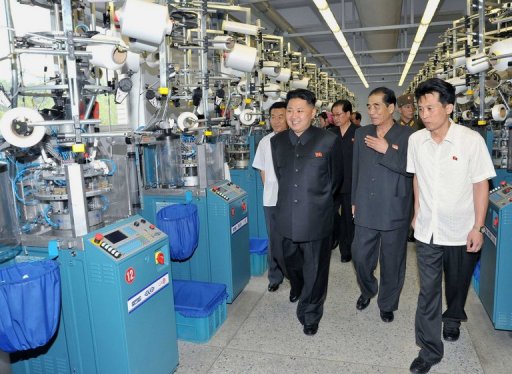China said Tuesday it signed agreements with North Korea pushing forward their joint development of economic zones, as the new leader in Pyongyang seeks to improve his country’s impoverished economy.
The agreements cover the setting up and operation of management committees in the zones in North Korea, electricity supply in one of them, and agricultural cooperation, China’s commerce ministry said in a statement.
They were signed as part of a high-level meeting between the two sides presided over by China’s commerce minister Chen Deming and Jang Song-Thaek, a top North Korean official who is the uncle of leader Kim Jong-Il.
China is the only major ally as well as main trade partner of North Korea, a heavily militarized country that has carried out underground nuclear explosions and ballistic missile tests yet struggles to feed its people.
Kim Jong-Un, who assumed power after the sudden death last year of his father Kim Jong-Il, told a visiting Chinese Communist party delegation this month that he was seeking economic development, Chinese state media reported at the time.
North Korea’s reliance on China, with which it shares a border, has increased as international sanctions over its missile and nuclear programmes tighten its ability to secure international credit and trade.
The Korean Central News Agency, Pyongyang’s official mouthpiece, reported Monday that Jang was leading a delegation for a third round of talks on the Hwanggumphyong and Wihwado Economic Zone and the Rason Economic Trade Zone.
North Korea and China are jointly developing the former on two islands in the estuary of the Yalu river that marks their border. Ground was broken in December. The Rason zone is in the northeastern part of North Korea near its borders with China and Russia.
China’s commerce ministry statement said that Hwanggumphyong and Wihwado will focus on sectors including information and tourism to “gradually become an intelligence-intensive emerging economic zone of North Korea.”
The Rason zone, meanwhile, will focus on areas including raw materials, equipment manufacturing, high-tech, apparel and high-efficiency agriculture, the statement said.
Rason will “gradually develop into an advanced manufacturing base for North Korea and an international logistics centre and regional tourist centre for Northeast Asia,” the statement said.
China’s importance to North Korea was highlighted by Kim Jong-Il traveling to China four times in less than two years at the end of his life. His last visit came in August 2011, just months before his death in December.

COMMENTS
Please let us know if you're having issues with commenting.